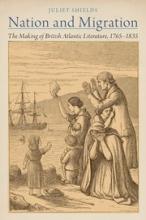Nation and Migration explores the significant contributions of Scotland, Ireland, and Wales to the development of a British Atlantic literature and culture, moving beyond traditional studies of transatlantic literature that focus on what Stephen Spender has described as the "love-hate relations" between the United States and England. By allowing England to stand in for the British archipelago, Juliet Shields argues, recent literary scholarship has oversimplified the processes through which the new United States differentiated itself culturally from Britain and underestimated the impact of migration on British nation formation during the late eighteenth and early nineteenth centuries.
In short, Nation and Migration provides a literary history for a nation that still considers itself a land of immigrants. Scottish, Irish, and Welsh migrants brought with them to the American colonies and early republic stories and traditions very different from those shared by English settlers. Americans looked to these stories for narratives of cultural and racial origins through which to legitimate their new nation. Writers situated in Britain's Celtic peripheries in turn drew on American discourses of rights and liberties to assert the cultural independence of Scotland, Ireland, and Wales from the English imperial center. The stories that late eighteenth- and early nineteenth-century Britons and Americans told about transatlantic migration and settlement, whether from the position of migrant or observer, reveal the tenuousness and fragility of Britain and the United States as relatively new national entities. These stories illustrate the dialectial relationship between nation and migration.
Nation and Migration
Juliet Shields, Nation and Migration: the making of British Atlantic Literature, 1765-1835 (Oxford University Press, 2016)
